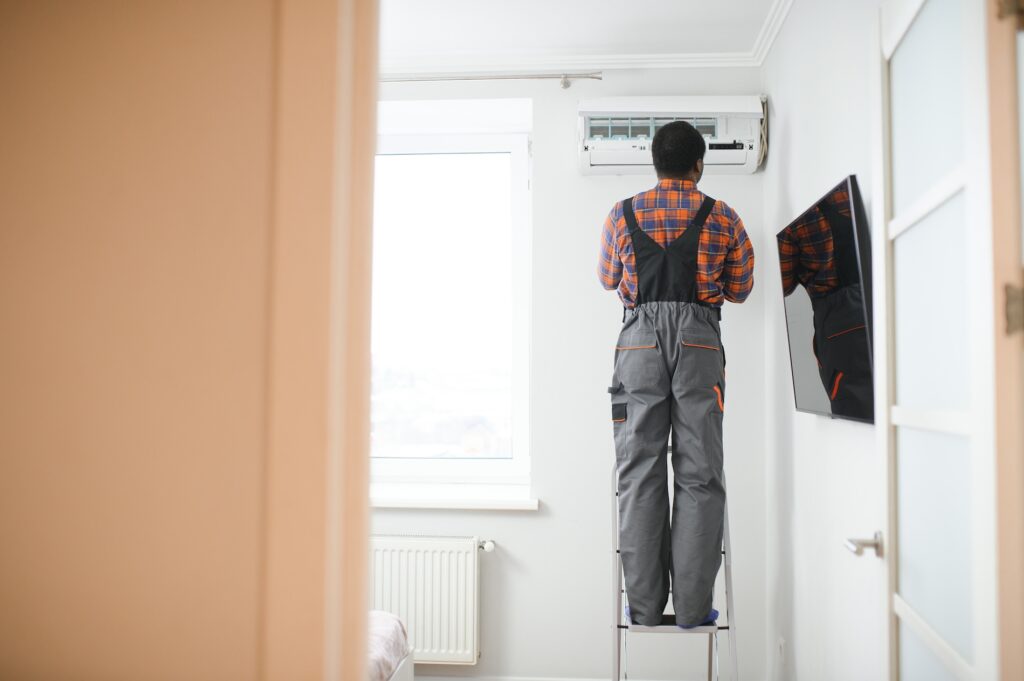A reliable air conditioning system is essential for maintaining comfortable home temperatures during hot seasons. However, like any other appliance, AC units will inevitably experience wear and tear or face mechanical issues over time. When your air conditioner is acting up, you may wonder whether it is more cost-effective to repair the problem or replace the entire system. Making the right decision can have a significant impact on your comfort and long-term finances.
Learn the essential factors to consider when weighing the options between AC repair and replacement. As experienced HVAC professionals, we understand the importance of finding a solution that ensures continued performance, energy efficiency, and cost-effectiveness. By considering system age, performance, repair costs, and potential energy savings, you can make an informed decision that aligns with your specific needs and budget.
1. Age of the System
The first factor to consider in the repair vs. replacement debate is the age of your existing air conditioning system. Most units have a lifespan of approximately 10 to 15 years, depending on maintenance routines and usage. If your system is nearing or has surpassed its expected lifespan, a replacement may be more beneficial than repairing an aging, less efficient unit.
Evaluating Expected Lifespan and Performance
Over time, even the most well-maintained AC systems lose their efficiency and performance. When deciding whether repair or replacement is the right option, assess the current condition of your unit and consider its age relative to the projected lifespan. It is often more cost-effective to replace a system approaching or exceeding its expected service life rather than invest in ongoing repairs.
2. Frequent Breakdowns and Costly Repairs
If your air conditioner continually experiences issues and requires frequent repairs, it may be more economical to invest in a new system. Frequent breakdowns not only cause discomfort but also incur high repair costs over time. Replacing the unit can provide a more reliable and efficient cooling solution, minimizing the expenses associated with constant repairs.
Gauging Repair Costs vs. Replacement Costs
When faced with an air conditioner issue, homeowners should compare the cost of repairing the current system against the cost of a new, more efficient unit. If the price of repair is more than half of the replacement cost, it may be wiser to invest in a new air conditioning system that will provide improved efficiency and long-term savings.
3. Energy Efficiency
Older air conditioning systems tend to operate at lower energy efficiency levels, resulting in higher utility costs. Newer AC units offer significant improvements in energy efficiency, which can lead to substantial savings on monthly energy bills. If you notice that your energy costs have increased despite regular maintenance, it may be time to consider a more energy-efficient replacement.
Return on Investment of Energy-Efficient Systems
In addition to reducing monthly utility costs, a more energy-efficient AC system can offer a high return on investment over time. The savings on energy bills will, in many cases, cover the initial costs of a newer, more efficient system, thus making it a wise financial choice for homeowners.
4. System Performance and Comfort
Another vital factor when deciding between repair and replacement is your air conditioner’s overall performance and the comfort it provides. If your system struggles to maintain consistent temperatures throughout your home, produces excessive noise, or fails to adequately cool your living spaces, investing in a new system may be the most effective solution to improve your indoor comfort.
When is AC Replacement the Right Solution?
If your air conditioner falls under any of the following categories, it might be time for an AC replacement:
- The system is nearing or beyond its expected lifespan
- Repair costs are consistently high and frequent
- The unit is no longer energy-efficient, resulting in higher utility bills
- Your system struggles to maintain comfortable indoor temperatures
Consulting with an experienced HVAC technician can provide invaluable guidance in determining the ideal course of action for your specific situation.
Conclusion:
Deciding between AC repair and replacement can be a challenging decision for homeowners. By examining the age of your system, repair costs, energy efficiency, and overall performance, you can confidently choose the course of action that best suits your specific needs and budget.
Our team of seasoned HVAC professionals at B.L.R. Heating & Air is here to guide you through the process, offering expert advice and reliable solutions that will enhance your home’s comfort and lead to long-term savings. When you’re ready to explore AC repair in Woods Cross, UT, or replacement options, contact us, and we will be more than happy to assist you!





